University Health and Social Care: Supporting Significant Life Events
VerifiedAdded on 2020/02/05
|11
|3784
|540
Report
AI Summary
This report examines a health and social care case study focusing on the impact of significant life events, particularly alcohol addiction, on individuals and their social networks. The assignment delves into the experiences of Richard and Sophie, exploring the devastating effects of addiction and the journey towards recovery. It analyzes the roles of healthcare professionals, organizational policies, and social support systems in aiding recovery. The report evaluates the effectiveness of various interventions, including therapeutic sessions, family support, and external resources, highlighting the importance of comprehensive care. It also discusses the application of theoretical principles, such as the stress-strain-relief theory, in formulating responses to addiction. Furthermore, the report assesses organizational policies and procedures, the contributions of individuals within social networks, and the suitability of external support sources. Recommendations are provided to improve support from health and social care organizations for individuals and their networks, emphasizing the need for proactive strategies and comprehensive care to address the challenges posed by significant life events.
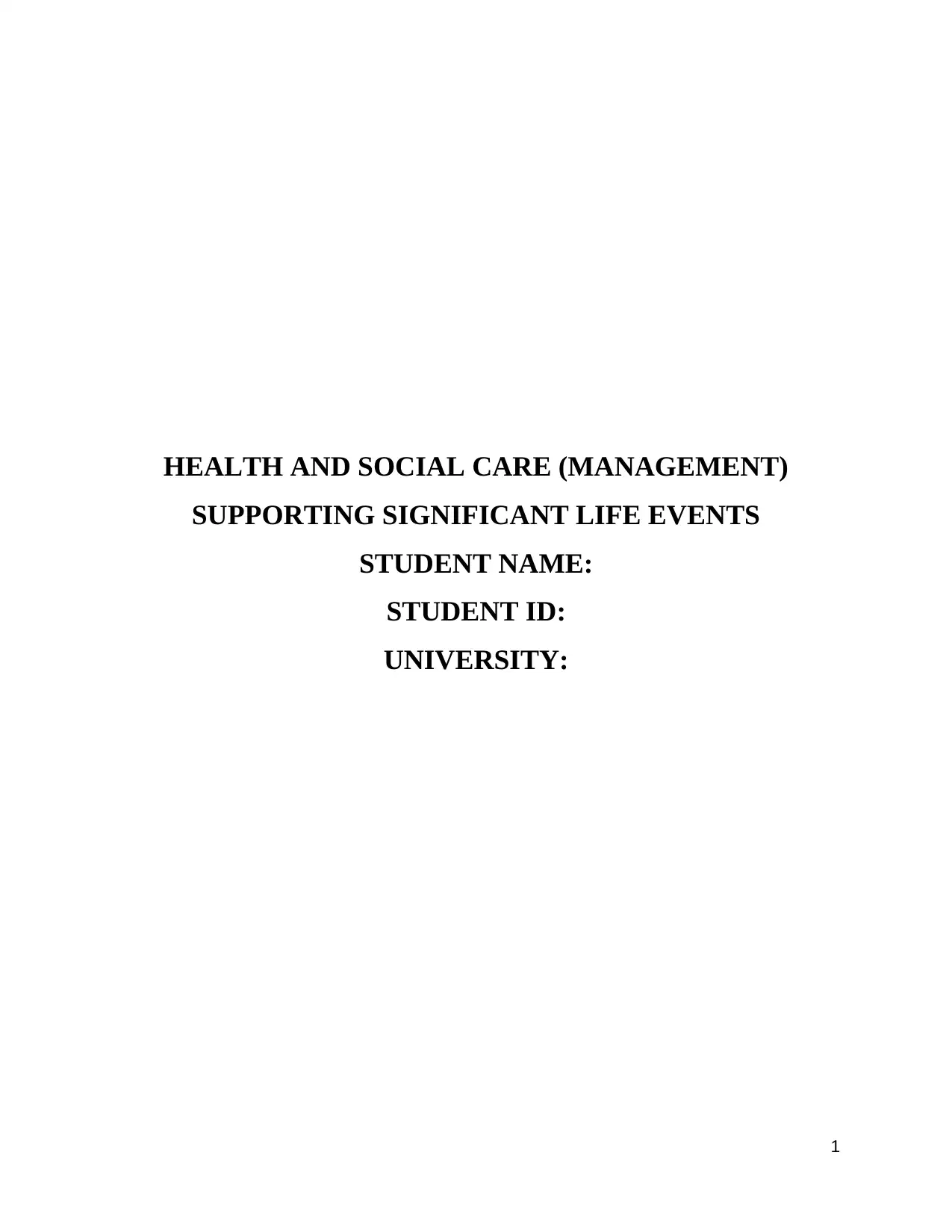
HEALTH AND SOCIAL CARE (MANAGEMENT)
SUPPORTING SIGNIFICANT LIFE EVENTS
STUDENT NAME:
STUDENT ID:
UNIVERSITY:
1
SUPPORTING SIGNIFICANT LIFE EVENTS
STUDENT NAME:
STUDENT ID:
UNIVERSITY:
1
Paraphrase This Document
Need a fresh take? Get an instant paraphrase of this document with our AI Paraphraser
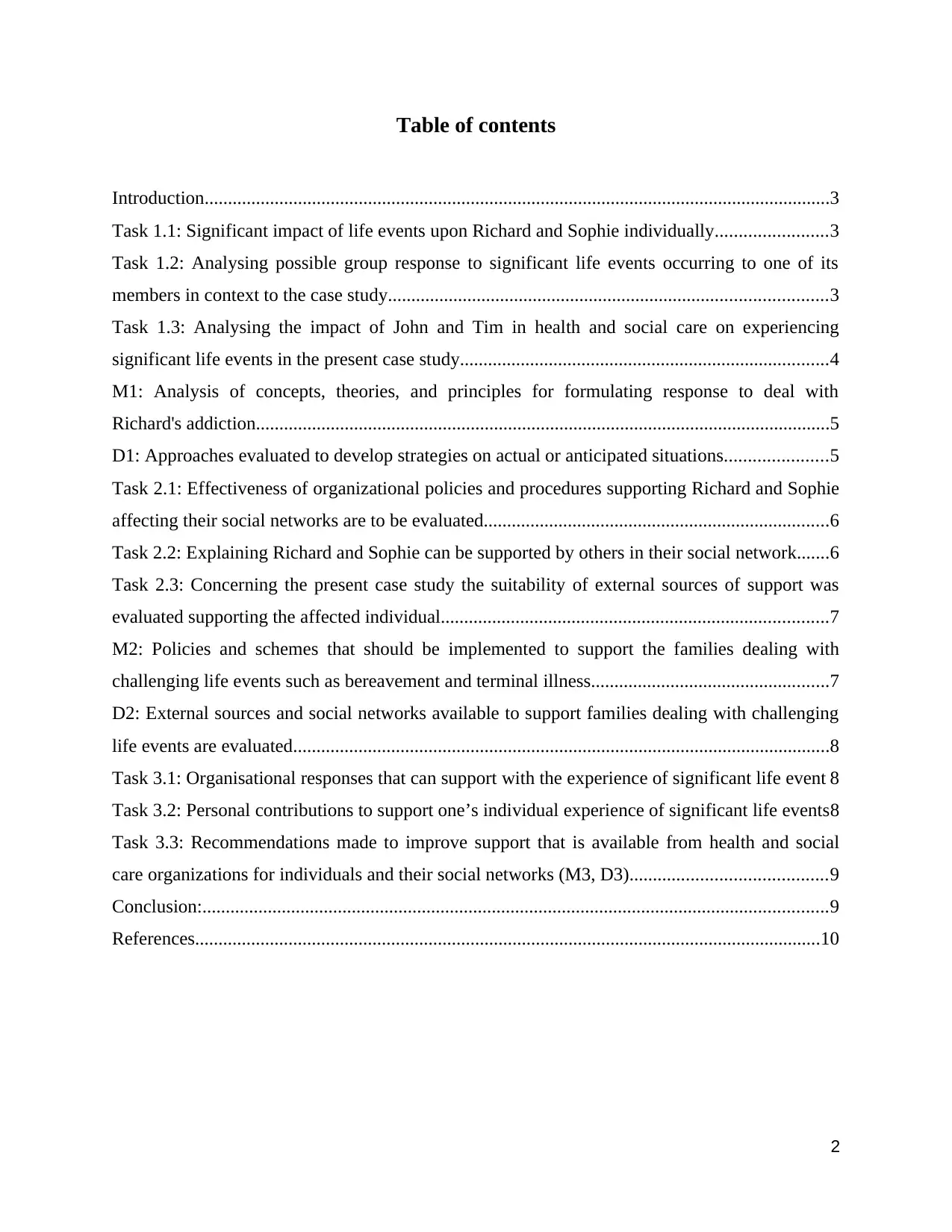
Table of contents
Introduction......................................................................................................................................3
Task 1.1: Significant impact of life events upon Richard and Sophie individually........................3
Task 1.2: Analysing possible group response to significant life events occurring to one of its
members in context to the case study..............................................................................................3
Task 1.3: Analysing the impact of John and Tim in health and social care on experiencing
significant life events in the present case study...............................................................................4
M1: Analysis of concepts, theories, and principles for formulating response to deal with
Richard's addiction...........................................................................................................................5
D1: Approaches evaluated to develop strategies on actual or anticipated situations......................5
Task 2.1: Effectiveness of organizational policies and procedures supporting Richard and Sophie
affecting their social networks are to be evaluated..........................................................................6
Task 2.2: Explaining Richard and Sophie can be supported by others in their social network.......6
Task 2.3: Concerning the present case study the suitability of external sources of support was
evaluated supporting the affected individual...................................................................................7
M2: Policies and schemes that should be implemented to support the families dealing with
challenging life events such as bereavement and terminal illness...................................................7
D2: External sources and social networks available to support families dealing with challenging
life events are evaluated...................................................................................................................8
Task 3.1: Organisational responses that can support with the experience of significant life event 8
Task 3.2: Personal contributions to support one’s individual experience of significant life events8
Task 3.3: Recommendations made to improve support that is available from health and social
care organizations for individuals and their social networks (M3, D3)..........................................9
Conclusion:......................................................................................................................................9
References......................................................................................................................................10
2
Introduction......................................................................................................................................3
Task 1.1: Significant impact of life events upon Richard and Sophie individually........................3
Task 1.2: Analysing possible group response to significant life events occurring to one of its
members in context to the case study..............................................................................................3
Task 1.3: Analysing the impact of John and Tim in health and social care on experiencing
significant life events in the present case study...............................................................................4
M1: Analysis of concepts, theories, and principles for formulating response to deal with
Richard's addiction...........................................................................................................................5
D1: Approaches evaluated to develop strategies on actual or anticipated situations......................5
Task 2.1: Effectiveness of organizational policies and procedures supporting Richard and Sophie
affecting their social networks are to be evaluated..........................................................................6
Task 2.2: Explaining Richard and Sophie can be supported by others in their social network.......6
Task 2.3: Concerning the present case study the suitability of external sources of support was
evaluated supporting the affected individual...................................................................................7
M2: Policies and schemes that should be implemented to support the families dealing with
challenging life events such as bereavement and terminal illness...................................................7
D2: External sources and social networks available to support families dealing with challenging
life events are evaluated...................................................................................................................8
Task 3.1: Organisational responses that can support with the experience of significant life event 8
Task 3.2: Personal contributions to support one’s individual experience of significant life events8
Task 3.3: Recommendations made to improve support that is available from health and social
care organizations for individuals and their social networks (M3, D3)..........................................9
Conclusion:......................................................................................................................................9
References......................................................................................................................................10
2
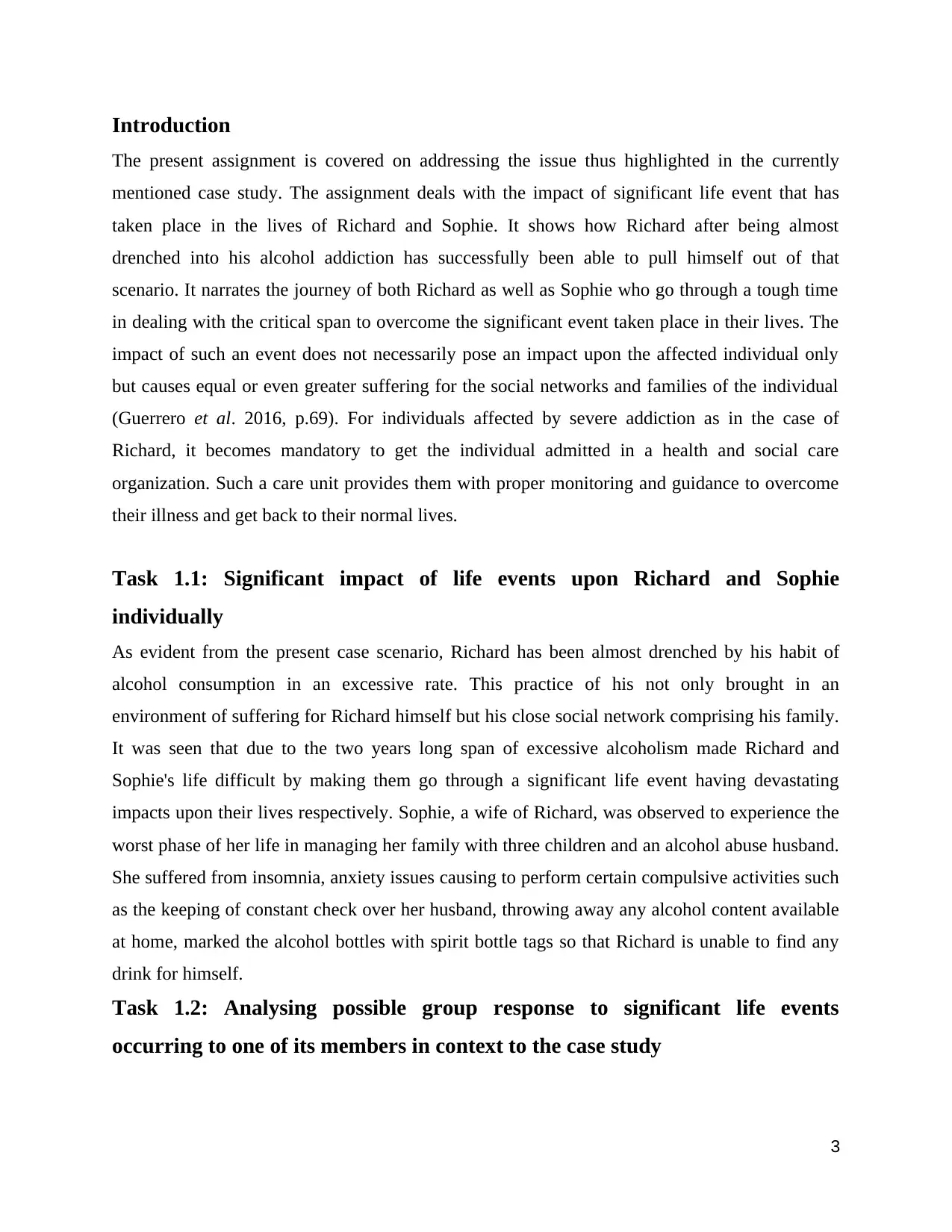
Introduction
The present assignment is covered on addressing the issue thus highlighted in the currently
mentioned case study. The assignment deals with the impact of significant life event that has
taken place in the lives of Richard and Sophie. It shows how Richard after being almost
drenched into his alcohol addiction has successfully been able to pull himself out of that
scenario. It narrates the journey of both Richard as well as Sophie who go through a tough time
in dealing with the critical span to overcome the significant event taken place in their lives. The
impact of such an event does not necessarily pose an impact upon the affected individual only
but causes equal or even greater suffering for the social networks and families of the individual
(Guerrero et al. 2016, p.69). For individuals affected by severe addiction as in the case of
Richard, it becomes mandatory to get the individual admitted in a health and social care
organization. Such a care unit provides them with proper monitoring and guidance to overcome
their illness and get back to their normal lives.
Task 1.1: Significant impact of life events upon Richard and Sophie
individually
As evident from the present case scenario, Richard has been almost drenched by his habit of
alcohol consumption in an excessive rate. This practice of his not only brought in an
environment of suffering for Richard himself but his close social network comprising his family.
It was seen that due to the two years long span of excessive alcoholism made Richard and
Sophie's life difficult by making them go through a significant life event having devastating
impacts upon their lives respectively. Sophie, a wife of Richard, was observed to experience the
worst phase of her life in managing her family with three children and an alcohol abuse husband.
She suffered from insomnia, anxiety issues causing to perform certain compulsive activities such
as the keeping of constant check over her husband, throwing away any alcohol content available
at home, marked the alcohol bottles with spirit bottle tags so that Richard is unable to find any
drink for himself.
Task 1.2: Analysing possible group response to significant life events
occurring to one of its members in context to the case study
3
The present assignment is covered on addressing the issue thus highlighted in the currently
mentioned case study. The assignment deals with the impact of significant life event that has
taken place in the lives of Richard and Sophie. It shows how Richard after being almost
drenched into his alcohol addiction has successfully been able to pull himself out of that
scenario. It narrates the journey of both Richard as well as Sophie who go through a tough time
in dealing with the critical span to overcome the significant event taken place in their lives. The
impact of such an event does not necessarily pose an impact upon the affected individual only
but causes equal or even greater suffering for the social networks and families of the individual
(Guerrero et al. 2016, p.69). For individuals affected by severe addiction as in the case of
Richard, it becomes mandatory to get the individual admitted in a health and social care
organization. Such a care unit provides them with proper monitoring and guidance to overcome
their illness and get back to their normal lives.
Task 1.1: Significant impact of life events upon Richard and Sophie
individually
As evident from the present case scenario, Richard has been almost drenched by his habit of
alcohol consumption in an excessive rate. This practice of his not only brought in an
environment of suffering for Richard himself but his close social network comprising his family.
It was seen that due to the two years long span of excessive alcoholism made Richard and
Sophie's life difficult by making them go through a significant life event having devastating
impacts upon their lives respectively. Sophie, a wife of Richard, was observed to experience the
worst phase of her life in managing her family with three children and an alcohol abuse husband.
She suffered from insomnia, anxiety issues causing to perform certain compulsive activities such
as the keeping of constant check over her husband, throwing away any alcohol content available
at home, marked the alcohol bottles with spirit bottle tags so that Richard is unable to find any
drink for himself.
Task 1.2: Analysing possible group response to significant life events
occurring to one of its members in context to the case study
3
⊘ This is a preview!⊘
Do you want full access?
Subscribe today to unlock all pages.

Trusted by 1+ million students worldwide
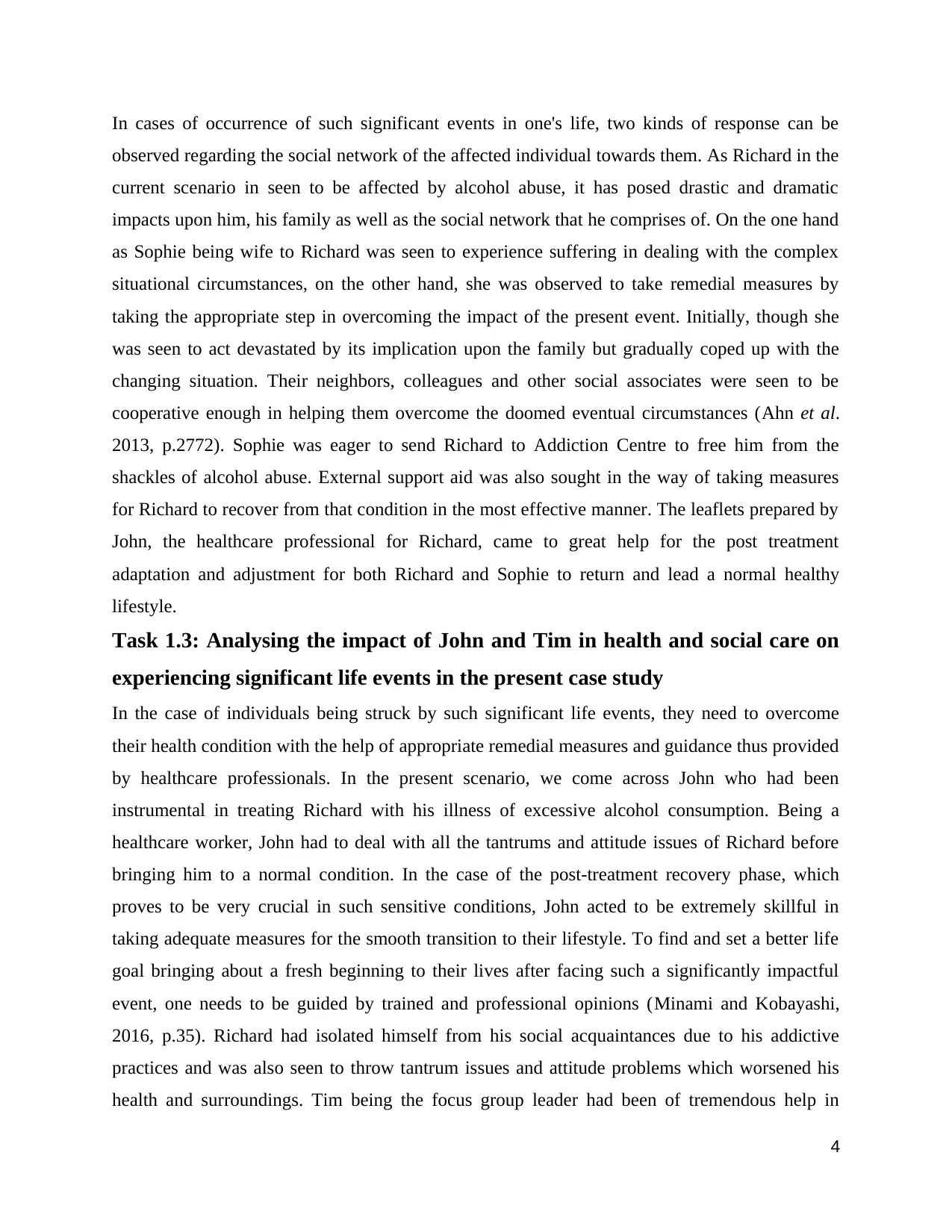
In cases of occurrence of such significant events in one's life, two kinds of response can be
observed regarding the social network of the affected individual towards them. As Richard in the
current scenario in seen to be affected by alcohol abuse, it has posed drastic and dramatic
impacts upon him, his family as well as the social network that he comprises of. On the one hand
as Sophie being wife to Richard was seen to experience suffering in dealing with the complex
situational circumstances, on the other hand, she was observed to take remedial measures by
taking the appropriate step in overcoming the impact of the present event. Initially, though she
was seen to act devastated by its implication upon the family but gradually coped up with the
changing situation. Their neighbors, colleagues and other social associates were seen to be
cooperative enough in helping them overcome the doomed eventual circumstances (Ahn et al.
2013, p.2772). Sophie was eager to send Richard to Addiction Centre to free him from the
shackles of alcohol abuse. External support aid was also sought in the way of taking measures
for Richard to recover from that condition in the most effective manner. The leaflets prepared by
John, the healthcare professional for Richard, came to great help for the post treatment
adaptation and adjustment for both Richard and Sophie to return and lead a normal healthy
lifestyle.
Task 1.3: Analysing the impact of John and Tim in health and social care on
experiencing significant life events in the present case study
In the case of individuals being struck by such significant life events, they need to overcome
their health condition with the help of appropriate remedial measures and guidance thus provided
by healthcare professionals. In the present scenario, we come across John who had been
instrumental in treating Richard with his illness of excessive alcohol consumption. Being a
healthcare worker, John had to deal with all the tantrums and attitude issues of Richard before
bringing him to a normal condition. In the case of the post-treatment recovery phase, which
proves to be very crucial in such sensitive conditions, John acted to be extremely skillful in
taking adequate measures for the smooth transition to their lifestyle. To find and set a better life
goal bringing about a fresh beginning to their lives after facing such a significantly impactful
event, one needs to be guided by trained and professional opinions (Minami and Kobayashi,
2016, p.35). Richard had isolated himself from his social acquaintances due to his addictive
practices and was also seen to throw tantrum issues and attitude problems which worsened his
health and surroundings. Tim being the focus group leader had been of tremendous help in
4
observed regarding the social network of the affected individual towards them. As Richard in the
current scenario in seen to be affected by alcohol abuse, it has posed drastic and dramatic
impacts upon him, his family as well as the social network that he comprises of. On the one hand
as Sophie being wife to Richard was seen to experience suffering in dealing with the complex
situational circumstances, on the other hand, she was observed to take remedial measures by
taking the appropriate step in overcoming the impact of the present event. Initially, though she
was seen to act devastated by its implication upon the family but gradually coped up with the
changing situation. Their neighbors, colleagues and other social associates were seen to be
cooperative enough in helping them overcome the doomed eventual circumstances (Ahn et al.
2013, p.2772). Sophie was eager to send Richard to Addiction Centre to free him from the
shackles of alcohol abuse. External support aid was also sought in the way of taking measures
for Richard to recover from that condition in the most effective manner. The leaflets prepared by
John, the healthcare professional for Richard, came to great help for the post treatment
adaptation and adjustment for both Richard and Sophie to return and lead a normal healthy
lifestyle.
Task 1.3: Analysing the impact of John and Tim in health and social care on
experiencing significant life events in the present case study
In the case of individuals being struck by such significant life events, they need to overcome
their health condition with the help of appropriate remedial measures and guidance thus provided
by healthcare professionals. In the present scenario, we come across John who had been
instrumental in treating Richard with his illness of excessive alcohol consumption. Being a
healthcare worker, John had to deal with all the tantrums and attitude issues of Richard before
bringing him to a normal condition. In the case of the post-treatment recovery phase, which
proves to be very crucial in such sensitive conditions, John acted to be extremely skillful in
taking adequate measures for the smooth transition to their lifestyle. To find and set a better life
goal bringing about a fresh beginning to their lives after facing such a significantly impactful
event, one needs to be guided by trained and professional opinions (Minami and Kobayashi,
2016, p.35). Richard had isolated himself from his social acquaintances due to his addictive
practices and was also seen to throw tantrum issues and attitude problems which worsened his
health and surroundings. Tim being the focus group leader had been of tremendous help in
4
Paraphrase This Document
Need a fresh take? Get an instant paraphrase of this document with our AI Paraphraser
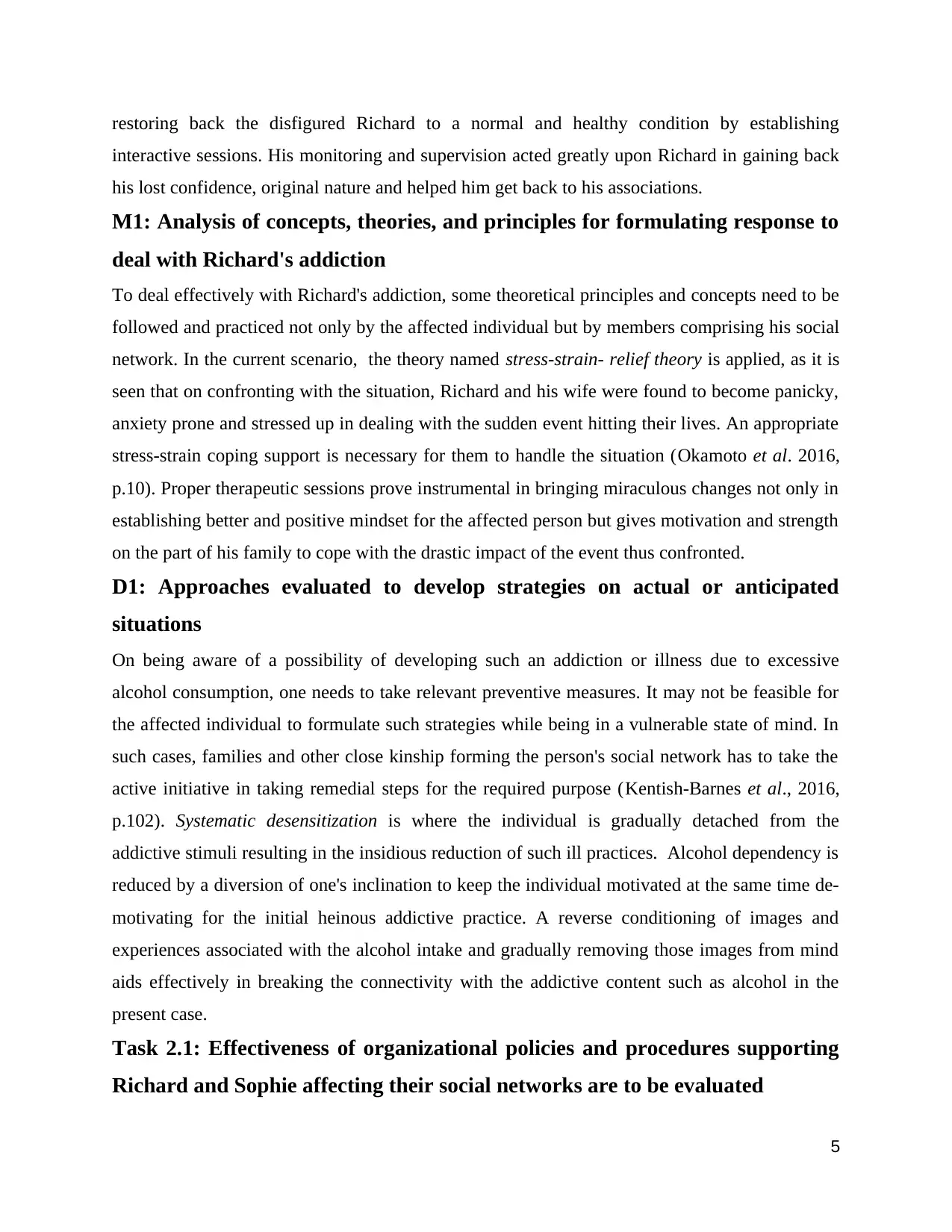
restoring back the disfigured Richard to a normal and healthy condition by establishing
interactive sessions. His monitoring and supervision acted greatly upon Richard in gaining back
his lost confidence, original nature and helped him get back to his associations.
M1: Analysis of concepts, theories, and principles for formulating response to
deal with Richard's addiction
To deal effectively with Richard's addiction, some theoretical principles and concepts need to be
followed and practiced not only by the affected individual but by members comprising his social
network. In the current scenario, the theory named stress-strain- relief theory is applied, as it is
seen that on confronting with the situation, Richard and his wife were found to become panicky,
anxiety prone and stressed up in dealing with the sudden event hitting their lives. An appropriate
stress-strain coping support is necessary for them to handle the situation (Okamoto et al. 2016,
p.10). Proper therapeutic sessions prove instrumental in bringing miraculous changes not only in
establishing better and positive mindset for the affected person but gives motivation and strength
on the part of his family to cope with the drastic impact of the event thus confronted.
D1: Approaches evaluated to develop strategies on actual or anticipated
situations
On being aware of a possibility of developing such an addiction or illness due to excessive
alcohol consumption, one needs to take relevant preventive measures. It may not be feasible for
the affected individual to formulate such strategies while being in a vulnerable state of mind. In
such cases, families and other close kinship forming the person's social network has to take the
active initiative in taking remedial steps for the required purpose (Kentish-Barnes et al., 2016,
p.102). Systematic desensitization is where the individual is gradually detached from the
addictive stimuli resulting in the insidious reduction of such ill practices. Alcohol dependency is
reduced by a diversion of one's inclination to keep the individual motivated at the same time de-
motivating for the initial heinous addictive practice. A reverse conditioning of images and
experiences associated with the alcohol intake and gradually removing those images from mind
aids effectively in breaking the connectivity with the addictive content such as alcohol in the
present case.
Task 2.1: Effectiveness of organizational policies and procedures supporting
Richard and Sophie affecting their social networks are to be evaluated
5
interactive sessions. His monitoring and supervision acted greatly upon Richard in gaining back
his lost confidence, original nature and helped him get back to his associations.
M1: Analysis of concepts, theories, and principles for formulating response to
deal with Richard's addiction
To deal effectively with Richard's addiction, some theoretical principles and concepts need to be
followed and practiced not only by the affected individual but by members comprising his social
network. In the current scenario, the theory named stress-strain- relief theory is applied, as it is
seen that on confronting with the situation, Richard and his wife were found to become panicky,
anxiety prone and stressed up in dealing with the sudden event hitting their lives. An appropriate
stress-strain coping support is necessary for them to handle the situation (Okamoto et al. 2016,
p.10). Proper therapeutic sessions prove instrumental in bringing miraculous changes not only in
establishing better and positive mindset for the affected person but gives motivation and strength
on the part of his family to cope with the drastic impact of the event thus confronted.
D1: Approaches evaluated to develop strategies on actual or anticipated
situations
On being aware of a possibility of developing such an addiction or illness due to excessive
alcohol consumption, one needs to take relevant preventive measures. It may not be feasible for
the affected individual to formulate such strategies while being in a vulnerable state of mind. In
such cases, families and other close kinship forming the person's social network has to take the
active initiative in taking remedial steps for the required purpose (Kentish-Barnes et al., 2016,
p.102). Systematic desensitization is where the individual is gradually detached from the
addictive stimuli resulting in the insidious reduction of such ill practices. Alcohol dependency is
reduced by a diversion of one's inclination to keep the individual motivated at the same time de-
motivating for the initial heinous addictive practice. A reverse conditioning of images and
experiences associated with the alcohol intake and gradually removing those images from mind
aids effectively in breaking the connectivity with the addictive content such as alcohol in the
present case.
Task 2.1: Effectiveness of organizational policies and procedures supporting
Richard and Sophie affecting their social networks are to be evaluated
5
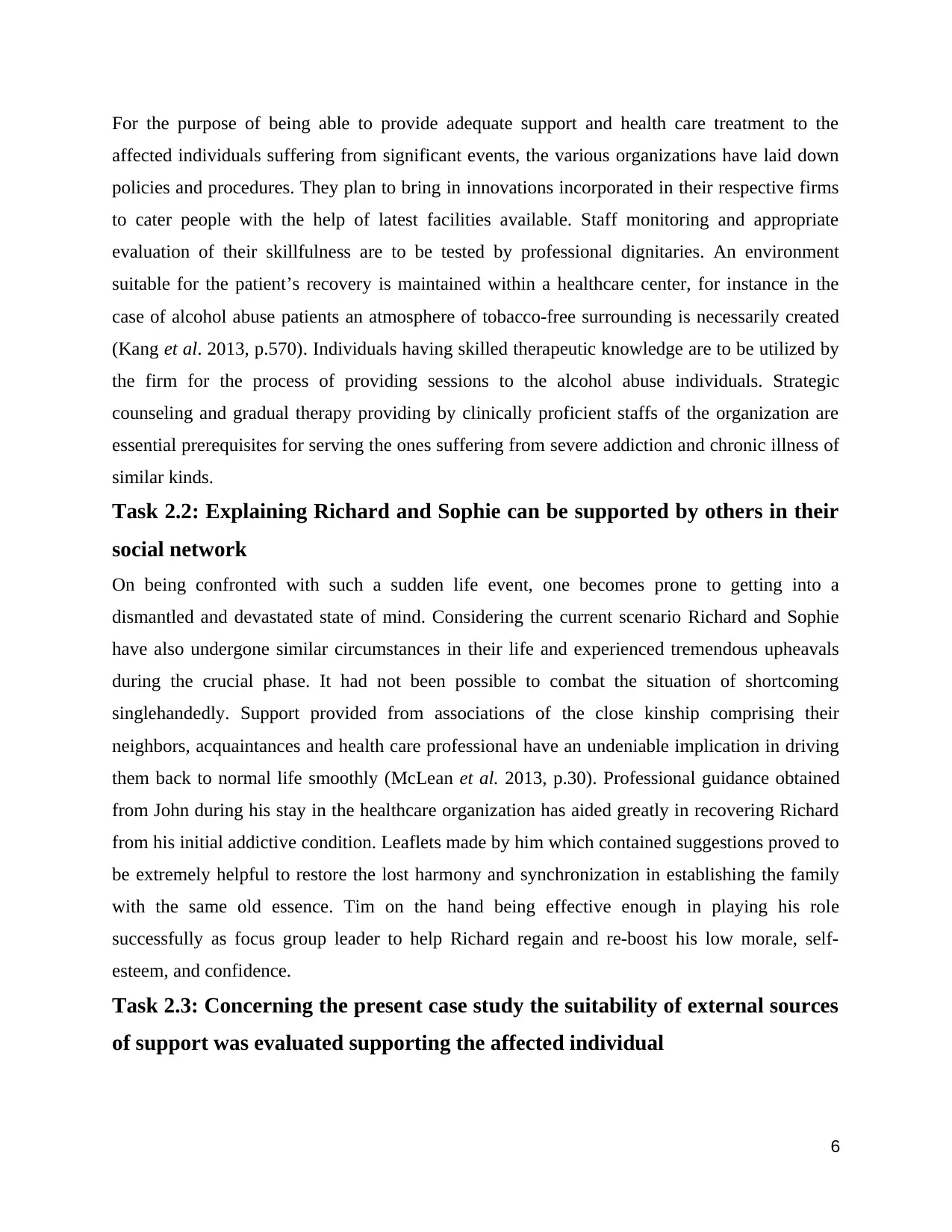
For the purpose of being able to provide adequate support and health care treatment to the
affected individuals suffering from significant events, the various organizations have laid down
policies and procedures. They plan to bring in innovations incorporated in their respective firms
to cater people with the help of latest facilities available. Staff monitoring and appropriate
evaluation of their skillfulness are to be tested by professional dignitaries. An environment
suitable for the patient’s recovery is maintained within a healthcare center, for instance in the
case of alcohol abuse patients an atmosphere of tobacco-free surrounding is necessarily created
(Kang et al. 2013, p.570). Individuals having skilled therapeutic knowledge are to be utilized by
the firm for the process of providing sessions to the alcohol abuse individuals. Strategic
counseling and gradual therapy providing by clinically proficient staffs of the organization are
essential prerequisites for serving the ones suffering from severe addiction and chronic illness of
similar kinds.
Task 2.2: Explaining Richard and Sophie can be supported by others in their
social network
On being confronted with such a sudden life event, one becomes prone to getting into a
dismantled and devastated state of mind. Considering the current scenario Richard and Sophie
have also undergone similar circumstances in their life and experienced tremendous upheavals
during the crucial phase. It had not been possible to combat the situation of shortcoming
singlehandedly. Support provided from associations of the close kinship comprising their
neighbors, acquaintances and health care professional have an undeniable implication in driving
them back to normal life smoothly (McLean et al. 2013, p.30). Professional guidance obtained
from John during his stay in the healthcare organization has aided greatly in recovering Richard
from his initial addictive condition. Leaflets made by him which contained suggestions proved to
be extremely helpful to restore the lost harmony and synchronization in establishing the family
with the same old essence. Tim on the hand being effective enough in playing his role
successfully as focus group leader to help Richard regain and re-boost his low morale, self-
esteem, and confidence.
Task 2.3: Concerning the present case study the suitability of external sources
of support was evaluated supporting the affected individual
6
affected individuals suffering from significant events, the various organizations have laid down
policies and procedures. They plan to bring in innovations incorporated in their respective firms
to cater people with the help of latest facilities available. Staff monitoring and appropriate
evaluation of their skillfulness are to be tested by professional dignitaries. An environment
suitable for the patient’s recovery is maintained within a healthcare center, for instance in the
case of alcohol abuse patients an atmosphere of tobacco-free surrounding is necessarily created
(Kang et al. 2013, p.570). Individuals having skilled therapeutic knowledge are to be utilized by
the firm for the process of providing sessions to the alcohol abuse individuals. Strategic
counseling and gradual therapy providing by clinically proficient staffs of the organization are
essential prerequisites for serving the ones suffering from severe addiction and chronic illness of
similar kinds.
Task 2.2: Explaining Richard and Sophie can be supported by others in their
social network
On being confronted with such a sudden life event, one becomes prone to getting into a
dismantled and devastated state of mind. Considering the current scenario Richard and Sophie
have also undergone similar circumstances in their life and experienced tremendous upheavals
during the crucial phase. It had not been possible to combat the situation of shortcoming
singlehandedly. Support provided from associations of the close kinship comprising their
neighbors, acquaintances and health care professional have an undeniable implication in driving
them back to normal life smoothly (McLean et al. 2013, p.30). Professional guidance obtained
from John during his stay in the healthcare organization has aided greatly in recovering Richard
from his initial addictive condition. Leaflets made by him which contained suggestions proved to
be extremely helpful to restore the lost harmony and synchronization in establishing the family
with the same old essence. Tim on the hand being effective enough in playing his role
successfully as focus group leader to help Richard regain and re-boost his low morale, self-
esteem, and confidence.
Task 2.3: Concerning the present case study the suitability of external sources
of support was evaluated supporting the affected individual
6
⊘ This is a preview!⊘
Do you want full access?
Subscribe today to unlock all pages.

Trusted by 1+ million students worldwide
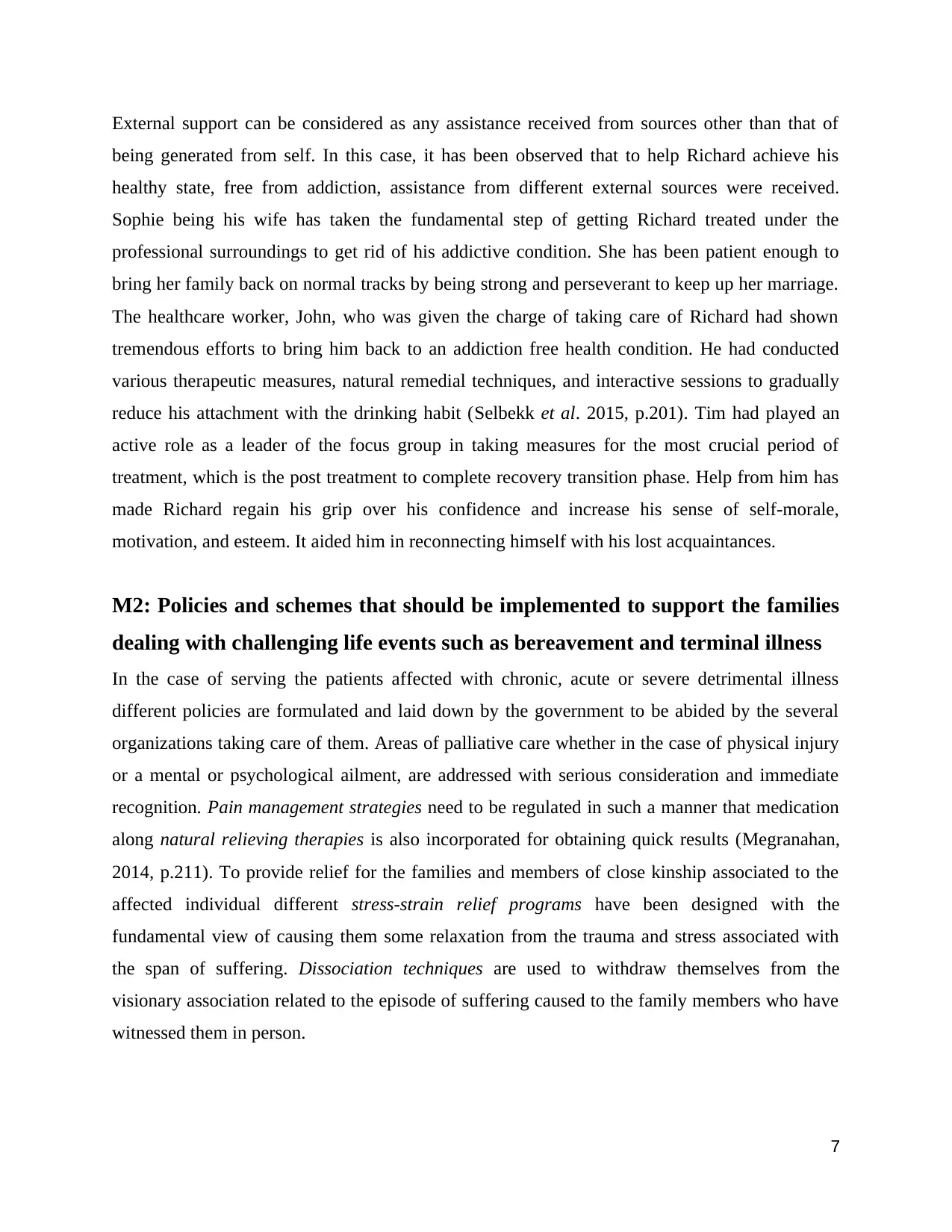
External support can be considered as any assistance received from sources other than that of
being generated from self. In this case, it has been observed that to help Richard achieve his
healthy state, free from addiction, assistance from different external sources were received.
Sophie being his wife has taken the fundamental step of getting Richard treated under the
professional surroundings to get rid of his addictive condition. She has been patient enough to
bring her family back on normal tracks by being strong and perseverant to keep up her marriage.
The healthcare worker, John, who was given the charge of taking care of Richard had shown
tremendous efforts to bring him back to an addiction free health condition. He had conducted
various therapeutic measures, natural remedial techniques, and interactive sessions to gradually
reduce his attachment with the drinking habit (Selbekk et al. 2015, p.201). Tim had played an
active role as a leader of the focus group in taking measures for the most crucial period of
treatment, which is the post treatment to complete recovery transition phase. Help from him has
made Richard regain his grip over his confidence and increase his sense of self-morale,
motivation, and esteem. It aided him in reconnecting himself with his lost acquaintances.
M2: Policies and schemes that should be implemented to support the families
dealing with challenging life events such as bereavement and terminal illness
In the case of serving the patients affected with chronic, acute or severe detrimental illness
different policies are formulated and laid down by the government to be abided by the several
organizations taking care of them. Areas of palliative care whether in the case of physical injury
or a mental or psychological ailment, are addressed with serious consideration and immediate
recognition. Pain management strategies need to be regulated in such a manner that medication
along natural relieving therapies is also incorporated for obtaining quick results (Megranahan,
2014, p.211). To provide relief for the families and members of close kinship associated to the
affected individual different stress-strain relief programs have been designed with the
fundamental view of causing them some relaxation from the trauma and stress associated with
the span of suffering. Dissociation techniques are used to withdraw themselves from the
visionary association related to the episode of suffering caused to the family members who have
witnessed them in person.
7
being generated from self. In this case, it has been observed that to help Richard achieve his
healthy state, free from addiction, assistance from different external sources were received.
Sophie being his wife has taken the fundamental step of getting Richard treated under the
professional surroundings to get rid of his addictive condition. She has been patient enough to
bring her family back on normal tracks by being strong and perseverant to keep up her marriage.
The healthcare worker, John, who was given the charge of taking care of Richard had shown
tremendous efforts to bring him back to an addiction free health condition. He had conducted
various therapeutic measures, natural remedial techniques, and interactive sessions to gradually
reduce his attachment with the drinking habit (Selbekk et al. 2015, p.201). Tim had played an
active role as a leader of the focus group in taking measures for the most crucial period of
treatment, which is the post treatment to complete recovery transition phase. Help from him has
made Richard regain his grip over his confidence and increase his sense of self-morale,
motivation, and esteem. It aided him in reconnecting himself with his lost acquaintances.
M2: Policies and schemes that should be implemented to support the families
dealing with challenging life events such as bereavement and terminal illness
In the case of serving the patients affected with chronic, acute or severe detrimental illness
different policies are formulated and laid down by the government to be abided by the several
organizations taking care of them. Areas of palliative care whether in the case of physical injury
or a mental or psychological ailment, are addressed with serious consideration and immediate
recognition. Pain management strategies need to be regulated in such a manner that medication
along natural relieving therapies is also incorporated for obtaining quick results (Megranahan,
2014, p.211). To provide relief for the families and members of close kinship associated to the
affected individual different stress-strain relief programs have been designed with the
fundamental view of causing them some relaxation from the trauma and stress associated with
the span of suffering. Dissociation techniques are used to withdraw themselves from the
visionary association related to the episode of suffering caused to the family members who have
witnessed them in person.
7
Paraphrase This Document
Need a fresh take? Get an instant paraphrase of this document with our AI Paraphraser
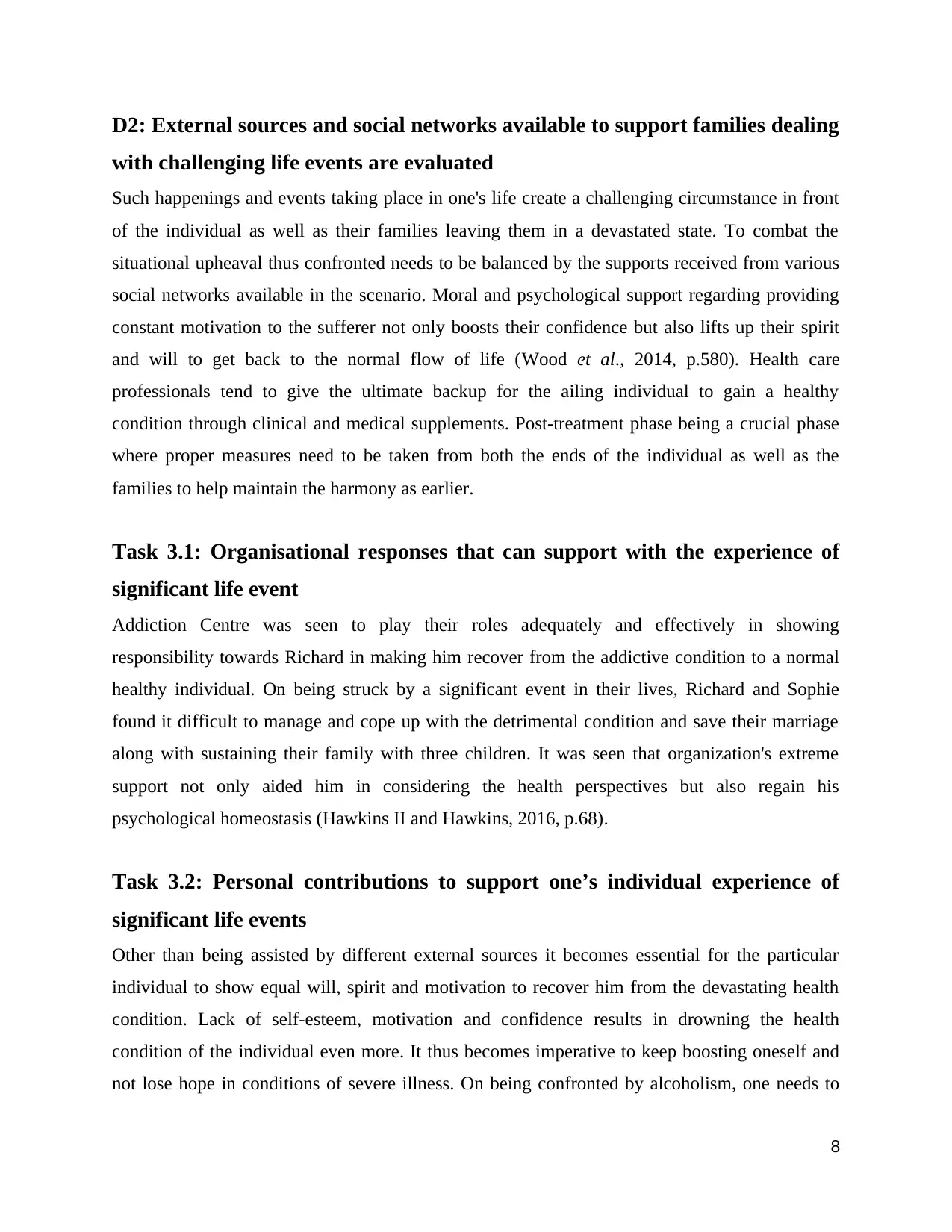
D2: External sources and social networks available to support families dealing
with challenging life events are evaluated
Such happenings and events taking place in one's life create a challenging circumstance in front
of the individual as well as their families leaving them in a devastated state. To combat the
situational upheaval thus confronted needs to be balanced by the supports received from various
social networks available in the scenario. Moral and psychological support regarding providing
constant motivation to the sufferer not only boosts their confidence but also lifts up their spirit
and will to get back to the normal flow of life (Wood et al., 2014, p.580). Health care
professionals tend to give the ultimate backup for the ailing individual to gain a healthy
condition through clinical and medical supplements. Post-treatment phase being a crucial phase
where proper measures need to be taken from both the ends of the individual as well as the
families to help maintain the harmony as earlier.
Task 3.1: Organisational responses that can support with the experience of
significant life event
Addiction Centre was seen to play their roles adequately and effectively in showing
responsibility towards Richard in making him recover from the addictive condition to a normal
healthy individual. On being struck by a significant event in their lives, Richard and Sophie
found it difficult to manage and cope up with the detrimental condition and save their marriage
along with sustaining their family with three children. It was seen that organization's extreme
support not only aided him in considering the health perspectives but also regain his
psychological homeostasis (Hawkins II and Hawkins, 2016, p.68).
Task 3.2: Personal contributions to support one’s individual experience of
significant life events
Other than being assisted by different external sources it becomes essential for the particular
individual to show equal will, spirit and motivation to recover him from the devastating health
condition. Lack of self-esteem, motivation and confidence results in drowning the health
condition of the individual even more. It thus becomes imperative to keep boosting oneself and
not lose hope in conditions of severe illness. On being confronted by alcoholism, one needs to
8
with challenging life events are evaluated
Such happenings and events taking place in one's life create a challenging circumstance in front
of the individual as well as their families leaving them in a devastated state. To combat the
situational upheaval thus confronted needs to be balanced by the supports received from various
social networks available in the scenario. Moral and psychological support regarding providing
constant motivation to the sufferer not only boosts their confidence but also lifts up their spirit
and will to get back to the normal flow of life (Wood et al., 2014, p.580). Health care
professionals tend to give the ultimate backup for the ailing individual to gain a healthy
condition through clinical and medical supplements. Post-treatment phase being a crucial phase
where proper measures need to be taken from both the ends of the individual as well as the
families to help maintain the harmony as earlier.
Task 3.1: Organisational responses that can support with the experience of
significant life event
Addiction Centre was seen to play their roles adequately and effectively in showing
responsibility towards Richard in making him recover from the addictive condition to a normal
healthy individual. On being struck by a significant event in their lives, Richard and Sophie
found it difficult to manage and cope up with the detrimental condition and save their marriage
along with sustaining their family with three children. It was seen that organization's extreme
support not only aided him in considering the health perspectives but also regain his
psychological homeostasis (Hawkins II and Hawkins, 2016, p.68).
Task 3.2: Personal contributions to support one’s individual experience of
significant life events
Other than being assisted by different external sources it becomes essential for the particular
individual to show equal will, spirit and motivation to recover him from the devastating health
condition. Lack of self-esteem, motivation and confidence results in drowning the health
condition of the individual even more. It thus becomes imperative to keep boosting oneself and
not lose hope in conditions of severe illness. On being confronted by alcoholism, one needs to
8
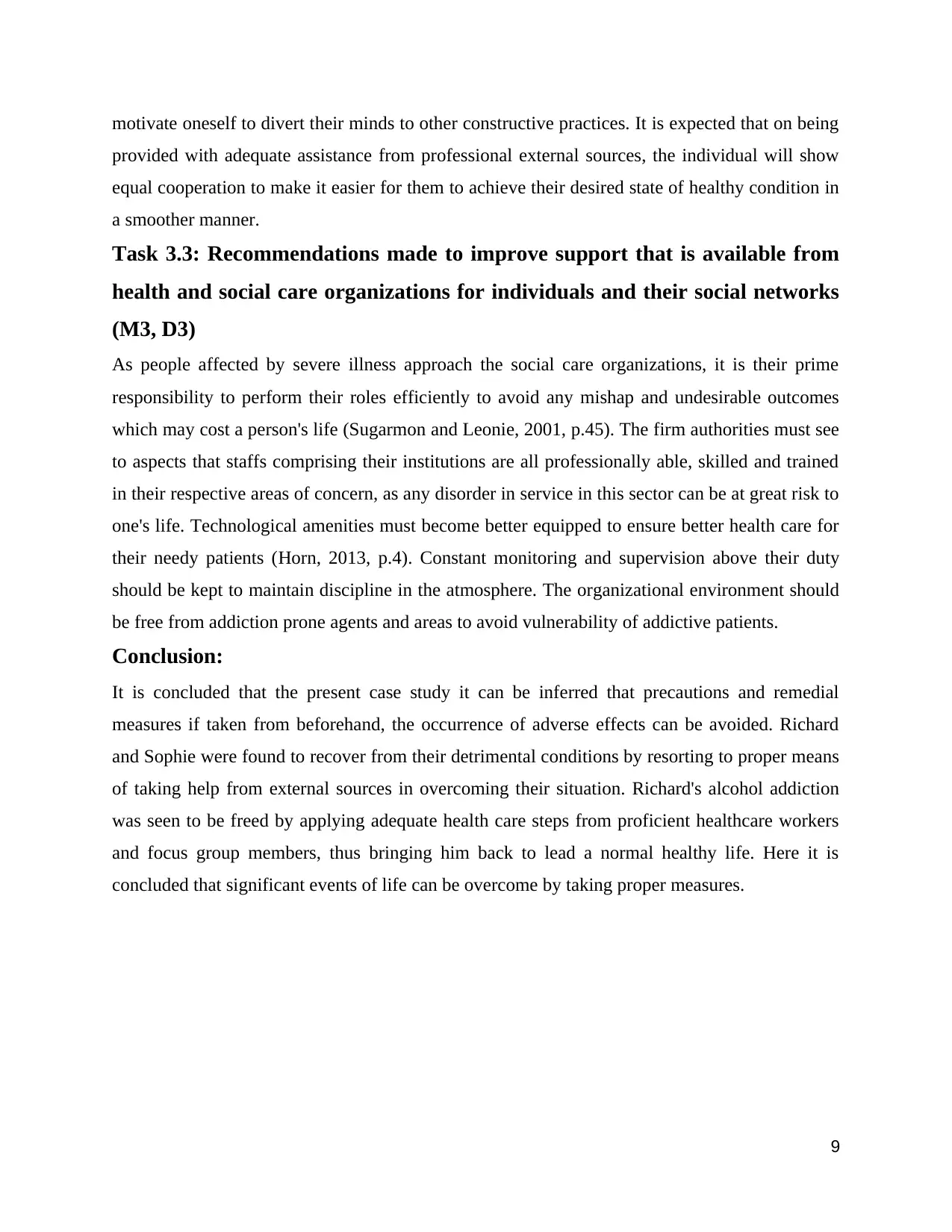
motivate oneself to divert their minds to other constructive practices. It is expected that on being
provided with adequate assistance from professional external sources, the individual will show
equal cooperation to make it easier for them to achieve their desired state of healthy condition in
a smoother manner.
Task 3.3: Recommendations made to improve support that is available from
health and social care organizations for individuals and their social networks
(M3, D3)
As people affected by severe illness approach the social care organizations, it is their prime
responsibility to perform their roles efficiently to avoid any mishap and undesirable outcomes
which may cost a person's life (Sugarmon and Leonie, 2001, p.45). The firm authorities must see
to aspects that staffs comprising their institutions are all professionally able, skilled and trained
in their respective areas of concern, as any disorder in service in this sector can be at great risk to
one's life. Technological amenities must become better equipped to ensure better health care for
their needy patients (Horn, 2013, p.4). Constant monitoring and supervision above their duty
should be kept to maintain discipline in the atmosphere. The organizational environment should
be free from addiction prone agents and areas to avoid vulnerability of addictive patients.
Conclusion:
It is concluded that the present case study it can be inferred that precautions and remedial
measures if taken from beforehand, the occurrence of adverse effects can be avoided. Richard
and Sophie were found to recover from their detrimental conditions by resorting to proper means
of taking help from external sources in overcoming their situation. Richard's alcohol addiction
was seen to be freed by applying adequate health care steps from proficient healthcare workers
and focus group members, thus bringing him back to lead a normal healthy life. Here it is
concluded that significant events of life can be overcome by taking proper measures.
9
provided with adequate assistance from professional external sources, the individual will show
equal cooperation to make it easier for them to achieve their desired state of healthy condition in
a smoother manner.
Task 3.3: Recommendations made to improve support that is available from
health and social care organizations for individuals and their social networks
(M3, D3)
As people affected by severe illness approach the social care organizations, it is their prime
responsibility to perform their roles efficiently to avoid any mishap and undesirable outcomes
which may cost a person's life (Sugarmon and Leonie, 2001, p.45). The firm authorities must see
to aspects that staffs comprising their institutions are all professionally able, skilled and trained
in their respective areas of concern, as any disorder in service in this sector can be at great risk to
one's life. Technological amenities must become better equipped to ensure better health care for
their needy patients (Horn, 2013, p.4). Constant monitoring and supervision above their duty
should be kept to maintain discipline in the atmosphere. The organizational environment should
be free from addiction prone agents and areas to avoid vulnerability of addictive patients.
Conclusion:
It is concluded that the present case study it can be inferred that precautions and remedial
measures if taken from beforehand, the occurrence of adverse effects can be avoided. Richard
and Sophie were found to recover from their detrimental conditions by resorting to proper means
of taking help from external sources in overcoming their situation. Richard's alcohol addiction
was seen to be freed by applying adequate health care steps from proficient healthcare workers
and focus group members, thus bringing him back to lead a normal healthy life. Here it is
concluded that significant events of life can be overcome by taking proper measures.
9
⊘ This is a preview!⊘
Do you want full access?
Subscribe today to unlock all pages.

Trusted by 1+ million students worldwide
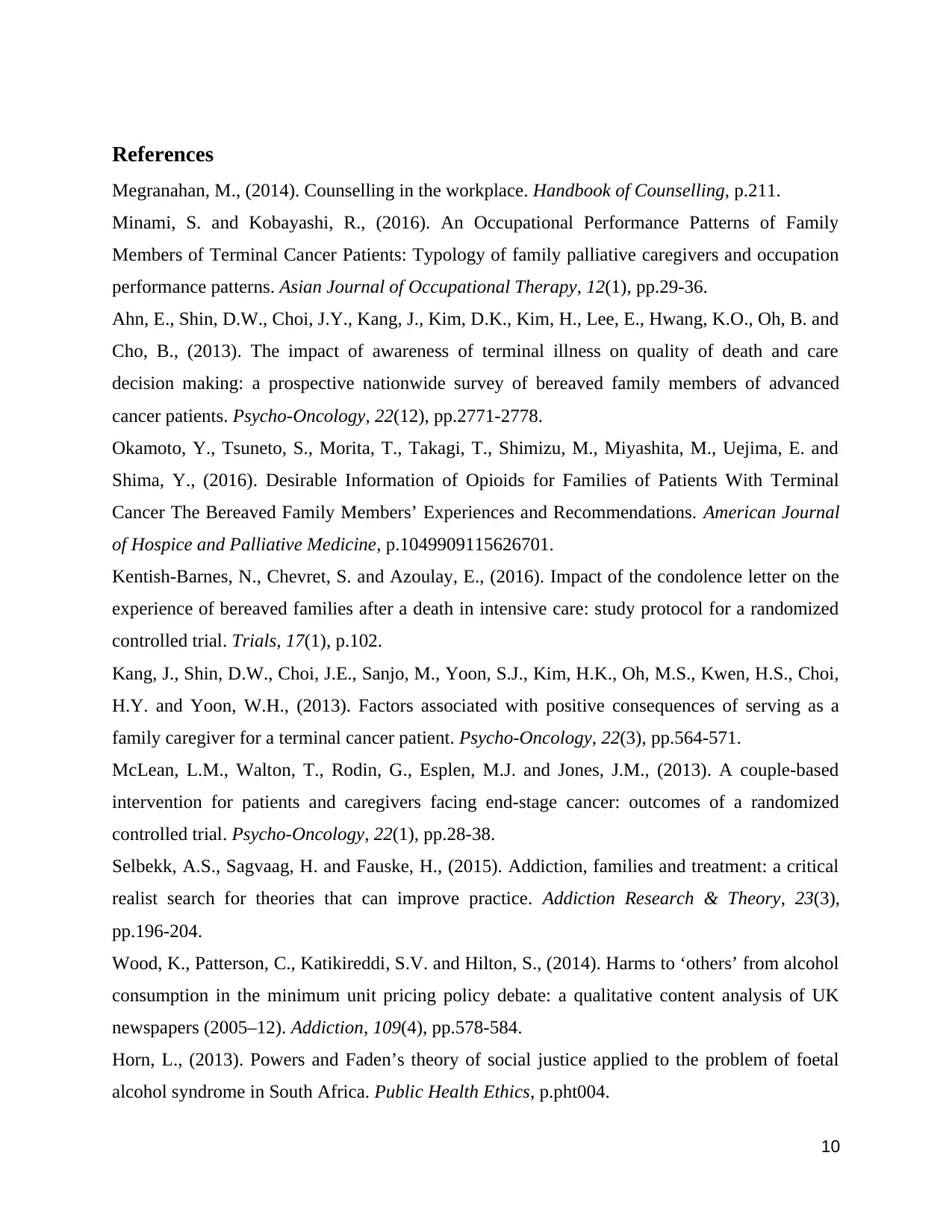
References
Megranahan, M., (2014). Counselling in the workplace. Handbook of Counselling, p.211.
Minami, S. and Kobayashi, R., (2016). An Occupational Performance Patterns of Family
Members of Terminal Cancer Patients: Typology of family palliative caregivers and occupation
performance patterns. Asian Journal of Occupational Therapy, 12(1), pp.29-36.
Ahn, E., Shin, D.W., Choi, J.Y., Kang, J., Kim, D.K., Kim, H., Lee, E., Hwang, K.O., Oh, B. and
Cho, B., (2013). The impact of awareness of terminal illness on quality of death and care
decision making: a prospective nationwide survey of bereaved family members of advanced
cancer patients. Psycho‐Oncology, 22(12), pp.2771-2778.
Okamoto, Y., Tsuneto, S., Morita, T., Takagi, T., Shimizu, M., Miyashita, M., Uejima, E. and
Shima, Y., (2016). Desirable Information of Opioids for Families of Patients With Terminal
Cancer The Bereaved Family Members’ Experiences and Recommendations. American Journal
of Hospice and Palliative Medicine, p.1049909115626701.
Kentish-Barnes, N., Chevret, S. and Azoulay, E., (2016). Impact of the condolence letter on the
experience of bereaved families after a death in intensive care: study protocol for a randomized
controlled trial. Trials, 17(1), p.102.
Kang, J., Shin, D.W., Choi, J.E., Sanjo, M., Yoon, S.J., Kim, H.K., Oh, M.S., Kwen, H.S., Choi,
H.Y. and Yoon, W.H., (2013). Factors associated with positive consequences of serving as a
family caregiver for a terminal cancer patient. Psycho‐Oncology, 22(3), pp.564-571.
McLean, L.M., Walton, T., Rodin, G., Esplen, M.J. and Jones, J.M., (2013). A couple‐based
intervention for patients and caregivers facing end‐stage cancer: outcomes of a randomized
controlled trial. Psycho‐Oncology, 22(1), pp.28-38.
Selbekk, A.S., Sagvaag, H. and Fauske, H., (2015). Addiction, families and treatment: a critical
realist search for theories that can improve practice. Addiction Research & Theory, 23(3),
pp.196-204.
Wood, K., Patterson, C., Katikireddi, S.V. and Hilton, S., (2014). Harms to ‘others’ from alcohol
consumption in the minimum unit pricing policy debate: a qualitative content analysis of UK
newspapers (2005–12). Addiction, 109(4), pp.578-584.
Horn, L., (2013). Powers and Faden’s theory of social justice applied to the problem of foetal
alcohol syndrome in South Africa. Public Health Ethics, p.pht004.
10
Megranahan, M., (2014). Counselling in the workplace. Handbook of Counselling, p.211.
Minami, S. and Kobayashi, R., (2016). An Occupational Performance Patterns of Family
Members of Terminal Cancer Patients: Typology of family palliative caregivers and occupation
performance patterns. Asian Journal of Occupational Therapy, 12(1), pp.29-36.
Ahn, E., Shin, D.W., Choi, J.Y., Kang, J., Kim, D.K., Kim, H., Lee, E., Hwang, K.O., Oh, B. and
Cho, B., (2013). The impact of awareness of terminal illness on quality of death and care
decision making: a prospective nationwide survey of bereaved family members of advanced
cancer patients. Psycho‐Oncology, 22(12), pp.2771-2778.
Okamoto, Y., Tsuneto, S., Morita, T., Takagi, T., Shimizu, M., Miyashita, M., Uejima, E. and
Shima, Y., (2016). Desirable Information of Opioids for Families of Patients With Terminal
Cancer The Bereaved Family Members’ Experiences and Recommendations. American Journal
of Hospice and Palliative Medicine, p.1049909115626701.
Kentish-Barnes, N., Chevret, S. and Azoulay, E., (2016). Impact of the condolence letter on the
experience of bereaved families after a death in intensive care: study protocol for a randomized
controlled trial. Trials, 17(1), p.102.
Kang, J., Shin, D.W., Choi, J.E., Sanjo, M., Yoon, S.J., Kim, H.K., Oh, M.S., Kwen, H.S., Choi,
H.Y. and Yoon, W.H., (2013). Factors associated with positive consequences of serving as a
family caregiver for a terminal cancer patient. Psycho‐Oncology, 22(3), pp.564-571.
McLean, L.M., Walton, T., Rodin, G., Esplen, M.J. and Jones, J.M., (2013). A couple‐based
intervention for patients and caregivers facing end‐stage cancer: outcomes of a randomized
controlled trial. Psycho‐Oncology, 22(1), pp.28-38.
Selbekk, A.S., Sagvaag, H. and Fauske, H., (2015). Addiction, families and treatment: a critical
realist search for theories that can improve practice. Addiction Research & Theory, 23(3),
pp.196-204.
Wood, K., Patterson, C., Katikireddi, S.V. and Hilton, S., (2014). Harms to ‘others’ from alcohol
consumption in the minimum unit pricing policy debate: a qualitative content analysis of UK
newspapers (2005–12). Addiction, 109(4), pp.578-584.
Horn, L., (2013). Powers and Faden’s theory of social justice applied to the problem of foetal
alcohol syndrome in South Africa. Public Health Ethics, p.pht004.
10
Paraphrase This Document
Need a fresh take? Get an instant paraphrase of this document with our AI Paraphraser
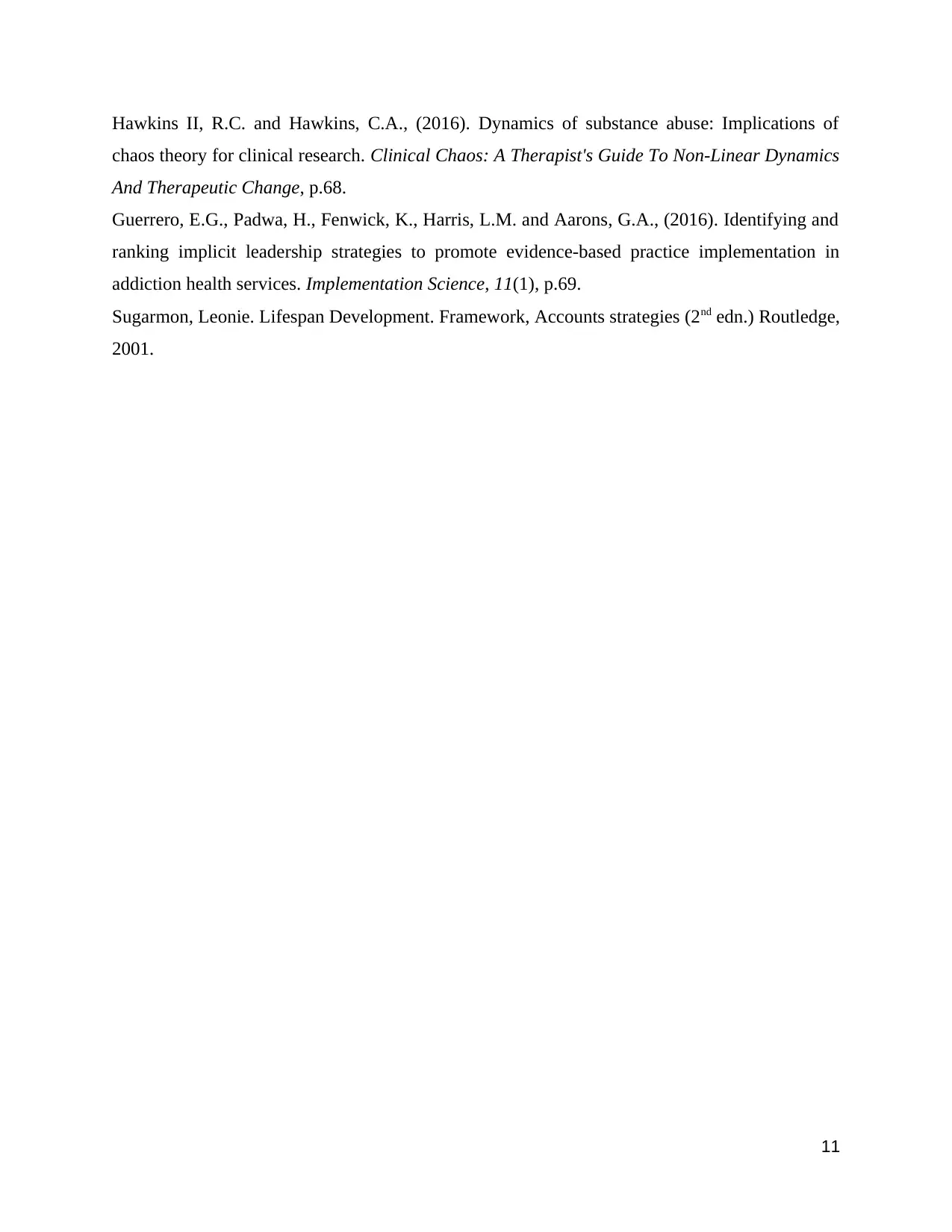
Hawkins II, R.C. and Hawkins, C.A., (2016). Dynamics of substance abuse: Implications of
chaos theory for clinical research. Clinical Chaos: A Therapist's Guide To Non-Linear Dynamics
And Therapeutic Change, p.68.
Guerrero, E.G., Padwa, H., Fenwick, K., Harris, L.M. and Aarons, G.A., (2016). Identifying and
ranking implicit leadership strategies to promote evidence-based practice implementation in
addiction health services. Implementation Science, 11(1), p.69.
Sugarmon, Leonie. Lifespan Development. Framework, Accounts strategies (2nd edn.) Routledge,
2001.
11
chaos theory for clinical research. Clinical Chaos: A Therapist's Guide To Non-Linear Dynamics
And Therapeutic Change, p.68.
Guerrero, E.G., Padwa, H., Fenwick, K., Harris, L.M. and Aarons, G.A., (2016). Identifying and
ranking implicit leadership strategies to promote evidence-based practice implementation in
addiction health services. Implementation Science, 11(1), p.69.
Sugarmon, Leonie. Lifespan Development. Framework, Accounts strategies (2nd edn.) Routledge,
2001.
11
1 out of 11
Related Documents
Your All-in-One AI-Powered Toolkit for Academic Success.
+13062052269
info@desklib.com
Available 24*7 on WhatsApp / Email
![[object Object]](/_next/static/media/star-bottom.7253800d.svg)
Unlock your academic potential
Copyright © 2020–2025 A2Z Services. All Rights Reserved. Developed and managed by ZUCOL.





